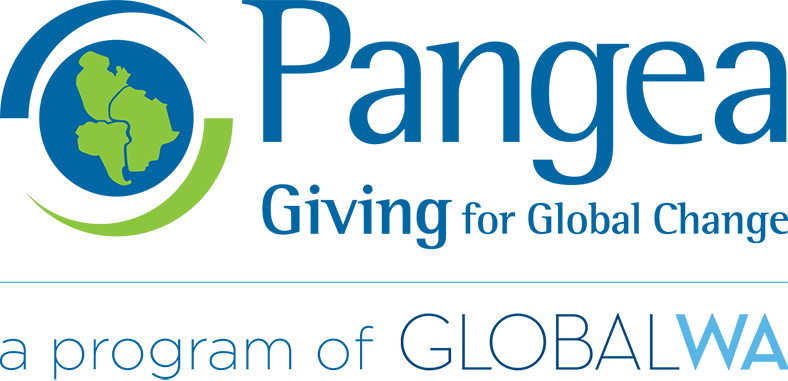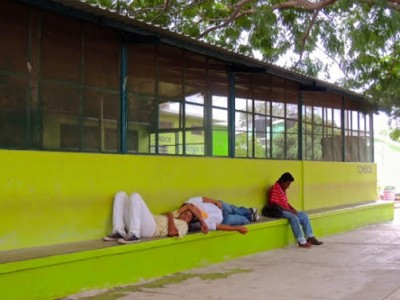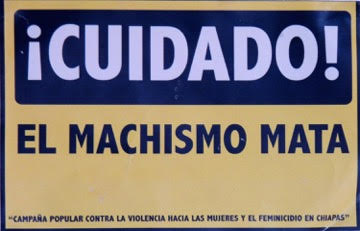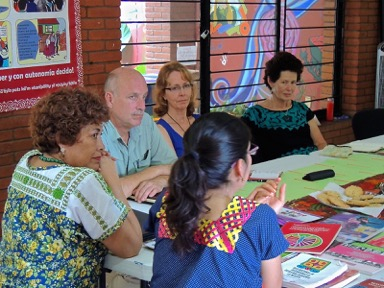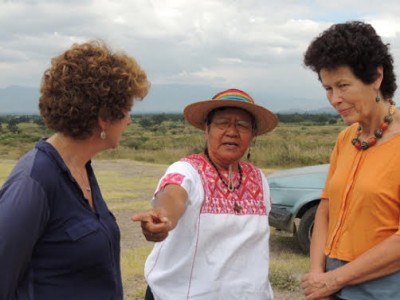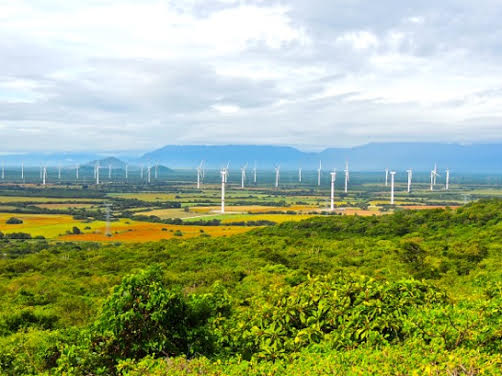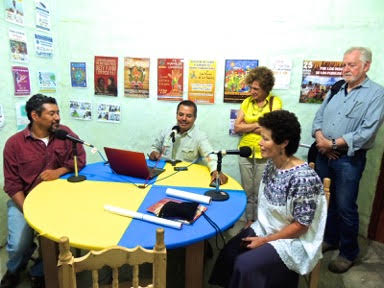Oaxaca Site Visits 2014: Search For Partners Inspires
Pangea’s Latin America pod recently returned from site visits to Oaxaca State in Mexico. Following is some context for, and a narrative of, the experience through the eyes of one of our members.
“There is no substitute for a site visit. The dramatic difference between talking, reading, or hearing about Pangea’s grantees versus the experience of meeting and getting to know them is immense. The ability to distance myself is no longer an option. To learn of and witness the exploitation and suffering of the people we met touched me at a visceral level and left a permanent imprint. I am different as I return home: more inspired and more deeply committed. To witness our dollars in action and to meet the inspirational people who selflessly carry on the struggle for their people is an emotional upheaval that is difficult to explain and must be experienced.” ~ Audrey Shiffman, Pangea Member
Oaxaca State is the indigenous conscience of Mexico with much history and tradition. There are 3.5 million inhabitants, 1/3 of whom are indigenous. A total of 53% of Mexico’s indigenous population lives in Oaxaca which includes 16 indigenous groups. Oaxaca is filled with a richness of resources and culture (some of the best food I’ve ever eaten!). It has diverse environments—beaches, mountains, eco reserves—that make it attractive to investors and tourists. Yet, despite its abundance, Oaxaca was recently ranked number one in Mexico human-rights violations, poverty, femicide(murder of females), and political repression and marginalization. Over 50% in the country lives in poverty. I was stunned to learn how the Mexican government is robbing the citizens of Oaxaca of their own abundance and offering it for export.
HEARTBREAKING STORIES
In all, we visited 14 organizations in seven days as possible grantees. All were enlightening in different ways. Our visit to two albergues (shelters) for undocumented migrants struggling to get to the United States, for example, was simply heartbreaking. Mostly from Honduras, Guatemala, and El Salvador, many of these men, women, and children were fleeing for their lives. Violence, poverty and discrimination all make living in their hometowns unbearable. On the road as migrants, these people are vulnerable to extortion, rape, kidnapping, and murder. The larger of the two albergues, Hermanos en el Camino is located in Ixtepec (on the Isthmus), a railway town where migrants hop the cargo trains that take them on the next leg of their journey north. In response to U.S. government pressure, the Mexican government is cracking down on migration. For example, they have created barriers to jumping on and off the trains. This has resulted in hideous accidents. And, they are checking buses randomly for undocumented workers. Our group of four visited this shelter where an all-volunteer staff meet the oncoming trains and guide these migrants to their center for medical attention, food, clothing, shelter, psychological assistance, and problem-solving. There were 100 or more in residence when we visited (a low number we were told). The stories they told were anguishing. One handsome young man was playing a guitar singing a ballad about migration. He was trying to get back to the U.S. to retrieve his children. He, his wife, and their two children were living in Arizona as undocumented workers. Over a month ago, his wife, on her way home, was stopped and ultimately deported. A few weeks later, he was deported and his children were left behind, relegated to foster care. With assistance from the volunteers at the shelter, he was working with an immigration lawyer to help him reunite with his children.
In the smaller albergue, COMI, in Oaxaca City, we met a man who had arrived the previous day from Guatemala. He had very little money and no idea how he was going to get to the U.S. All he had was his hollow, sad desperation. We were all humbled by his plight.
A reoccurring theme among staff and volunteers at every site visit was the concept of “auto cuidado”—self-care. Staff and volunteers witness so much trauma and violation daily that there is danger of a debilitating type of burn-out characterized by exhaustion, de-personalization, and a form of energy depletion that can impact the quality of their life and work. It was reassuring to know that they make “auto cuidado” an important aspect of their work. Perhaps more disturbing than the psychological perils staff and volunteers face is how dangerous it is to be an advocate/activist for indigenous rights. Many of the staff we heard from deal with harassment and even death threats from the government, cartels, or large corporations that they are fighting against. Disappearances and assassinations are common. In the last 10 years 60,000 women have disappeared. Two cultural issues make women more vulnerable than men: 1) machismo and 2) the pervasive climate of violence in Mexico among certain elements. Working on behalf of women’s safety issues is CONSORSIO, another organization we visited.
CONSORCIO is a network of human-rights defenders. Among their many services, CONSORCIO is the only organization in all of Mexico that keeps a daily record of women murder victims. The government does not keep such a record.
CHANGE IN PROGRESS
When I experience the overwhelming suffering of others it is hard to ignore the hopelessness I sometimes feel; I battle with myself around change and how I might contribute. My efforts seem small and insignificant, so why bother? Then I meet someone who teaches me that one small step toward change and making a difference in someone’s life is what life is all about. Carmen, the woman who founded and runs Flor Y Canto, (a Pangea Grantee) is one of those rare angels who devote their life to defending the rights of others by empowering them to act for themselves. She is a fireball. Charismatic, engaging, and warm, it was an honor to watch her in action. Flor y Canto is a unified water rights organization serving 16 communities by helping them defend their water rights and develop techniques to raise water levels in their communities by capturing rainwater. We drove with her to attend a town meeting in San Pedro Apostol on issues pertaining to the government restrictions on water. Watching her in action was truly uplifting.
Ges Mujeres, another organization we visited, develops leadership and educational programs for sexual health and reproductive rights for women. We were very impressed. Unlike Flor y Canto, where Carmen is a dominating figure, Ges Mujeres was fostering the next generation of leaders before our very eyes.
Founded in 1977, Ges Mujeres was the first feminist organization in Oaxaca. Through their research, models of intervention for leadership, and training programs they are a transformational force that is creating a society that respects the rights of women and helps girls to reach their maximum capacity. In one of their programs, they search for girls in the communities of Oaxaca State who are identified as “natural leaders.” They invite these girls to apply to their leadership-training program. One of their graduates is now a staff member of Ges Mujeres and she gave us first hand knowledge of the difference this program has made for her and her community. The director of Ges Mujeres, Ximena, had all staff members present for our presentation. By watching the way in which she both cultivates their talents and defers to their expertise, we could see why this is such a successful program.
LESSONS ON THE ISTHMUS
On our visit to the Isthmus, we were surprised to learn about the devastating effect the new wind farm industry has had on the area. While wind energy is thought to be a clean source of energy, it is not generated without serious consequences on the local culture and economy. The foundations for the windmills are dug so deeply that they alter the flow of ground water with a disastrous effect on the water tables local farmers rely upon. Farmland was denuded to make way for windmills. The local shrimp industry was impacted by the high frequency sound waves emitted by the towers. And, of course, it created a hazard for birds. The painful ironies of this invasion are that none of the electricity generated goes to the community— it is all sold to Guatemala—and that none of the profits are returned to the community! We also learned about Consulta Previa (prior consent), formally known as ILO Convention No. 169. This convention is a wide-ranging, legally binding international instrument (ratified by Mexico, among others) that requires, as a fundamental principle, that indigenous and tribal peoples be consulted and fully participate at all levels of the decision-making process on issues that concern them. No such consultations took place. The wind farms (as well as many mining projects) are clear examples of the failure of government and corporations to inform the indigenous communities of their intentions and get input.
Naaxwiin (pronounced Nashween) means “Eye of the Motherland. “ This program gets most of its funding from the Mexican government and addresses gender violence and sexual and reproductive rights for women. Naaxwiin works in schools with youth and trains health promoters in their community. Both their programs for gender violence and reproductive health already have a 2nd generation of promoters. While Mexico’s record for violence toward women has risen, it has fallen in at least one of the communities where Naaxwiin works. Naaxwiin has a dream to develop an additional program for micro-credit loans to women wishing to start a business.
Ucizoni is probably the best-funded program we visited on the Isthmus. For those of you who read Wendy Call’s No Word for Welcome, Ucizoni is the umbrella organization founded by Carlos Beas that Wendy wrote about. It has grown impressively. Their services are comprehensive: sustainable farming, advocacy, citizenship program, psychological services, legal assistance, and gender equality.
They even have a radio station that informs communities of important local topics, and our very own Betsy Hale was a drop-in guest who explained on-air about Pangea and our visit. We were all so proud!!
“It will take months—perhaps longer—for me to fully absorb and understand all we experienced. It’s been a challenge to overcome my emotional reactions and let the narrative speak for itself. I know that I am more enriched as a person for having taken this journey. Being a witness to the suffering and human-rights violations I encountered will serve as a motivation for me to keep talking, learning, and working toward a more just world. I also know Pangea works, and it’s worth the effort!
~Audrey Shiffman
11/26/14
